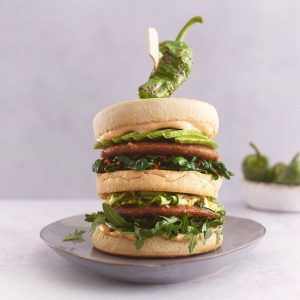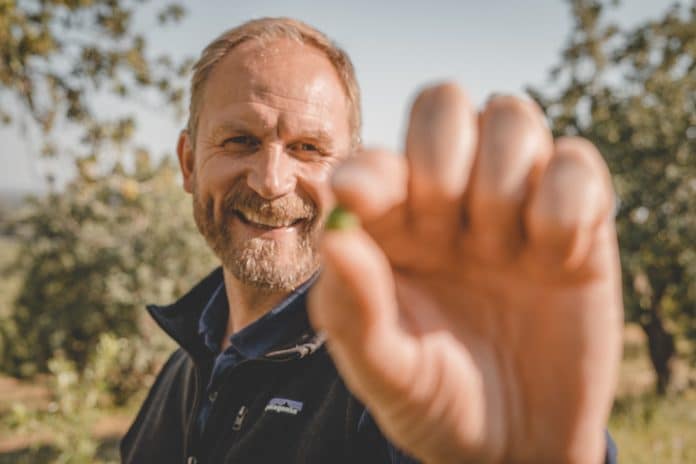SME Magazine caught up with Morten Toft Bech, founder of Meatless Farm, to find out the story behind one of Britain’s most successful start-ups.
 To begin with, Morten, tell us about the background to Meatless Farm. When did you set it up and what was the thinking behind it?
To begin with, Morten, tell us about the background to Meatless Farm. When did you set it up and what was the thinking behind it?
The idea came to me in 2016 when my wife and I were frustrated with the lack of tasty and affordable meat-free choices that the whole family could enjoy. So I began researching meat alternatives using pea and vegetable protein, focusing on taste and texture, and after more than two years in development, the Meatless Farm plant-based mince was born. In 2018 – needing funding beyond my own – I received backing from a group of private investors, and launched the mince into Sainsbury’s.
As well as creating a solution for a meat alternative that we could all enjoy as a family and that wasn’t too expensive, I wanted to help reduce the world’s dependency on intensively farmed meat and take steps towards making a beneficial difference to the planet by allowing people to make their favourite dishes meatless without compromising on taste and texture.
Environment is at the heart of Meatless Farm. We’re not anti-meat or pro-vegan, we’re aiming to inspire ‘meat-lessers’ to eat more plant-based not convert them to veganism. Four years on, we’re one of the UK’s fastest growing plant-based brands with a range of products from mince to chicken breast, burgers, meatballs and sausages, and available in more than 20 countries with major retail and foodservice partners.
What experiences did you already have which helped you launch the company?
My background is in finance and I’m often quoted as a ‘serial entrepreneur’ within the technology sector. But I like to work with a purpose and that was the main driver behind the ‘what’ and ‘why’ of Meatless Farm. My passion for innovation and technology – for finding a solution – inspired Meatless Farm and my years in finance and technology meant I had the understanding and experience to see it through. The company is a hive of growth and ambition and it’s fantastic to have other entrepreneurial and purpose-driven thinkers as part of the Meatless Farm family.
You started in Leeds and have grown quickly. How many people do you employ now and where are they in world?
Leeds was the perfect home for us and remains our UK headquarters today, although we’ve outgrown our original office. We’re proud that Leeds has such a prominent role in our journey. It’s the UK’s fastest-growing city and we’re a fast-growing company so we complement each other well. Through our growth, we’re able to give back to the area that helped make us and we continue to create new jobs.
We’re proud to employ 120 around the world (half are in the UK) as we’ve expanded into more countries and continents outside of the UK, continuing to break into new territories.
Which High Street outlets do you work with?
We’re fortunate to work with several major high street outlets and we’re continuing to add to the list. We have a range of Meatless Farm products, such as our plant-based meatballs and burgers, on menus in high street favourites such as Pret, Leon and Itsu. And, with the launch of our plant-based chicken breast this year, it’s opened up even more opportunities (such as Fridays, one of the UK’s largest American restaurant chains)
Last year we turned Pret’s iconic meatball wrap meatless for Veganuary. It became a bestseller and was added to the menu permanently. Since then, it’s inspired new products such as the Meatless Meatball protein pot and more recently the Meatless Meatball & Feta Hot Rice Bowl.
You’ve recently linked up with Fridays (formerly TGI Fridays). Can you tell us about that?
This is a fantastic partnership and Fridays have trusted us to take on some of their iconic dishes and create plant-based versions. The new plant-based menu is designed to offer even greater choice to vegans, vegetarians, flexitarians and those simply keen to try something different. Fridays is a nationwide chain so makes plant-based options accessible to all.
Fridays is a favourite go-to restaurant and caters to a wide customer base, so they knew that they needed a strong plant-based offering with it being such an upwards trend. It was a pleasure putting this menu together and highlights how vegans, vegetarians, flexitarians and meat eaters can come together for a meal and not be bored by the options. That’s the key to these partnerships, not being lazy with the menus and instead seeing it as an opportunity to offer a no-compromise alternative for a favourite dish or creating something new.
How has the demand for plant-based food products increased in recent years?
 The demand for plant-based food is the highest it has ever been. We carried out research at the start of the year, which showed almost half of UK respondents (43%) plan to eat more plant-based food in 2022 compared to just one in 10 (9%) in 2019 before the pandemic. Veganuary has also seen its highest number of sign-ups, which encourages people to go vegan for the month of January. We saw our mince sales increase by 21% this Veganuary compared to last year.
The demand for plant-based food is the highest it has ever been. We carried out research at the start of the year, which showed almost half of UK respondents (43%) plan to eat more plant-based food in 2022 compared to just one in 10 (9%) in 2019 before the pandemic. Veganuary has also seen its highest number of sign-ups, which encourages people to go vegan for the month of January. We saw our mince sales increase by 21% this Veganuary compared to last year.
The demand for a range of products is there too, so we recently launched five frozen products into Morrisons (mince, burgers, sausages, chicken burgers) and our plant-based meatballs, which were previously only available through foodservice. It was a hit as the range sold at a rate of one every 35 seconds during store opening hours with meatballs and mince making up 50% of sales. Our quest is to democratise plant-based meat, making it accessible for all. This isn’t just about burgers but continually innovating to help make every day eating occasions meatless. And with the plant-based market expected to be worth $140bn by 2029 according to a Barclays report, we’ve not even peaked yet.
How sustainable are your products?
When it comes to our product range, our core principles are prioritising high-quality ingredients that are plant-based, from sustainable sources, and first-rate suppliers with food safety accreditation. On average, Meatless Farm products use 90% less land and 70-80% less water than their meat counterparts and contribute to biodiversity*. Environment is at the heart of the brand and its ambition is to reduce the world’s meat consumption by 50%.
What do you find best about being your own boss? And the worst?
The best thing about being my own boss is seeing my ideas come to life and finding other people who are just as passionate and want to join the cause. The worst thing is learning to be more hands-off. It’s my instinct to get involved with everything – you can’t do it all but I have a trusted and ambitious team on board to drive innovation forward.
* New data analysis of Poore & Nemecek


